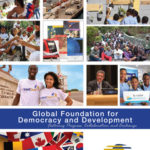Publications
Every year GFDD publishes books on topics relevant to the Dominican Republic and the world. Through these publications, GFDD presents new perspectives and contributes innovative solutions to the pressing issues and challenges of contemporary society in the Dominican Republic and the world, contributing to sustainable social, democratic, economic and cultural development.

-

Prison Reform in the Dominican Republic: An Analysis through the lens of the United Nations Sustainable Development Goals
by Jennifer Peirce
This report puts a spotlight on what is typically the least-visible and least-resourced of justice institutions: the prison system. First, prisons represent the most direct manifestation of state control over its citizenry. As the famous Dostoyevsky quote notes, how a state treats its prisoners tells you how a state treats its people more generally.
-
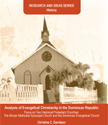
Analysis of Evangelical Christianity in the Dominican Republic
by Christina C. Davidson
This study examines the history and current state of evangelical Christianity in the Dominican Republic. It focuses on two historical Protestant denominations: The African Methodist Episcopal Church (ame) and the Dominican Evangelical Church (ied). Each of these denominations was founded in the Dominican Republic during key moments in the country’s history.
-
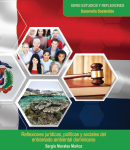
Legal, Political, and Social Reflections on the Dominican Environmental Framework
by Sergio Morales Muñoz
These reflections involve several intertwined issues such as climate change, environmental assessments, sustainable development, the environment, and ecosystems, among others, in the Dominican Republic. At the same time, it deals with the economic, political, and social reality of the country, since—as we are human—our realities, uses, and customs (those that affect the environment) are closely related to the actions that arise from our activities.
-
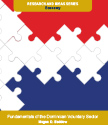
Fundamentals of the Dominican Voluntary Sector
by Megan D. Beddow
A variety of perspectives produce the knowledge representing a nation’s NGO environment. Statistical reports by development agencies and multilateral organizations heavily populate previous work related to NGO efforts in the Dominican Republic (European Commission, International Monetary Fund, United Nations, USAID, World Bank, etc.). This perspective trains its audience to focus on metrics for human or natural resource development but often avoids discussion of the structures utilized to achieve anticipated outcomes.
-
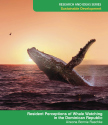
Resident Perceptions of Whale Watching in the Dominican Republic
Whale watching is often seen as a sustainable form of tourism that can
support coastal communities, while also protecting cetaceans (whales,
dolphins and porpoises) from some human pressures. The Dominican
Republic is home to one of the oldest and most unique whale watching
industries in the world, both in terms of the experiences that it offers
travelers, and due to its innovative co-management strategy. -
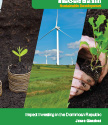
Impact Investing in the Dominican Republic
by Jenna Giandoni
Before appreciating the potential of impact investing, specifically in the DR, one must consider the Global Impact Investing Network (giin) generally-accepted definition of impact investments: “investments made into companies, organizations, and funds with the intention to generate measurable social and environmental impact alongside a financial return. Impact investing includes investments that range from producing a return of principal capital to offering market‐rate or even market‐beating financial returns (…)
-
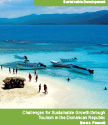
Challenges for Sustainable Growth through Tourism in the Dominican Republic
by Emma Fawcett
The Dominican Republic has long been viewed primarily as an exporter of sugar, coffee, and tobacco, but in the last decades the service sector has overtaken agriculture as the economy’s largest employer, due in part to growth in the tourism industry. This report explores tourism sector governance in the Dominican Republic, identifying key challenges in establishing sustainable, inclusive growth through tourism. The author offers practical policy solutions that highlight the need for capacity building, partnership creation, and public participation of all relevant stakeholders within the tourism industry at the national, regional, and local levels.
-
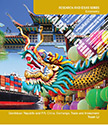
Dominican Republic and P. R. China: Exchange, Trade and Investment
by Yuan Li
Evidence of Chinese influence in the Dominican Republic is quite prevalent, visible not only in the popular Chinatown section of the capital city of Santo Domingo but also in the adoption of the “pica pollo” culinary tradition, one in which classical Dominican food items such as plantains and rice are prepared using Chinese techniques and deemed “creole.”
-
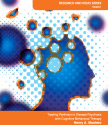
Treating Parkinson’s Disease Psychosis with Cognitive Behavioral Therapy
by Henry A. Montero
The publication contributes to the body of scientific research on Parkinson’s disease and mental health development in Latin American and Caribbean countries, as well as to the application of Cognitive Behavioral Therapy (CBT) for psychosis dueto Parkinson’s disease, a common medical condition in the Dominican Republic.
-
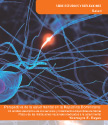
Mental Health Perspectives: a detailed analysis of services and treatments in Monte Plate and national institutions specializing in mental health
by Yosmayra E. Reyes
The Dominican Republic is a country on the brink of change both socially and economically. It is marked by a complex system whose aims have fallen short in distributing adequate health services to its indigent populations. Solutions in resource allocations are difficult as little research has been done with the intent of monitoring which subgroups and regions require additional servicing.
Buy it on Amazon | Download it here >
-
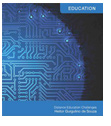
Distance Education Challenges
by Heitor Gurgulino de Souza
This book is an overview of distance education initiatives in Latin American, Asia, Europe, and the USA. The author challenges your mind to rethink distance education and the new characteristics of students, professors, universities, governments and information technology companies.
-
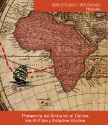
The Presence of Africa in the Caribbean, the Antilles and the United States
by: C. Albert Batista, P. Bellegarde-Smith, D. Blanco, L. Collado, F. Franco, J. Ghasmann Bissainthe, J. Guerrero, R. Javis Luis and others
Colonial slavery from the 16th century establishes an obligatory context for understanding the history and culture of Santo Domingo. It is also provides an indispensable key to comprehend the early and universal history that emerged from the relationship between Europe, Africa and America.
Buy it on Amazon (English – Spanish) | Download it here >
-
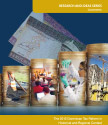
The 2012 Dominican Tax Reform in Historical and Regional Context
by James E. Mahon Jr.
The book presents and analysis of the challenges and scope of the 2012 tax reforms, placing them in an historical and geographical context while proposing options and developing opportunities for their future development.
-
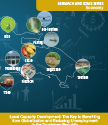
Local Capacity Development: The Key to Benefiting from Globalization and Reducing Unemployment in the Dominican Republic
by José G. Caraballo-Cueto
The book studies the Dominican economic model, in particular, it analyzes the impact of external sectors on the economy and the effect of economic growth on job creation and the labor market. In the same way, it discusses the conventional justification for a Free Trade agreement and explains why such an agreement can be counterproductive if there are asymmetries in the productive capacity. The research explains some theoretical aspects of the labor market and opens the analysis, as well as the results of the current Dominican growth model: jobless growth with stagnant wages.
-
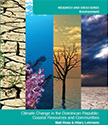
Climate Change in the Dominican Republic: Coastal Resources and Communities
by Matt Rosa & Hilary Lohmann
The climate of the Dominican Republic, like many other Small Island Developing States (sids), is greatly influenced by large oceanatmosphere interactions such as trade winds and El Niño. Tropical cyclones, hurricanes, and sea level rise also constitute important components of this climate. As a country that is highly sensitive to such changes in the climate and to sea-level rise, the Dominican Republic is therefore experiencing the more severe effects of climate change sooner than most nations.
-

Towards Sustainable Development and the Green Economy in the Dominican Republic
Is a publication of Global Foundation for Democracy and Development (GFDD) that promotes hands-on daily tips to green our everyday lives and businesses while showing international best practices and lessons learned on sustainability.
-
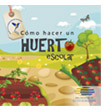
School Community Gardens Manual
The program for Community Gardens (EcoHuertos) has become a real national movement. GFDD/FUNGLODE are glad to share this experience through this practical guide.
Download your Guide HERE
-
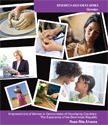
Empowerment of Women in Democracies of Developing Countries: The Experience of the Dominican Republic
by Rosa Rita Álvarez
Since the last century, Dominican women have struggled long and hard to overcome the factors that determine the social, economic, cultural and political inequalities that affect them. These struggles were strengthened after the establishment of our democratic system. Since then, several constitutions have been proclaimed that incorporated legal enhancements favoring gender equity and the advancement of women.
Buy it on Amazon (English – Spanish) | Download it here >
-
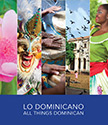
Lo Dominicano I All Things Dominican
A GFDD/Funglode publication for light reading, both in English and Spanish, that offers a quick and fresh take on the main features of Dominicanness, and the country’s cultural and natural endowments, all from a modern and innovative perspective that’s easy to understand, with an emphasis on intriguing and little-known details.
-
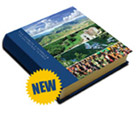
New Perspectives: Dominican Republic
Comprised of 400 aerial images, the book is divided into 9 chapters – Reflections of Light, Coasts, Heights, Plains, History, City, People, Tourism and Work – containing text pertaining to various aspects of the country’s history, culture, environment and contemporary life. It has become a point of reference for the national population, visitors, students, art and photography aficionados, the numerous Dominicans that reside outside the country and all those interested in a better understanding of the Dominican Republic.
-
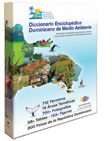
Dominican Encyclopedic Dictionary of the Environment
This book is an A-Z guide on the environment and natural resources of the Dominican Republic. It contains 712 terms defined with the most up-to-date and comprehensive information, and is illustrated with 700 photos, 58 tables, 123 figures, which are complemented by 17 scientific articles on environmental challenges and conservation methods. The Dictionary seeks to increase understanding of the dangers of environmental degradation, while promoting respect, care and concern for the country’s natural resources, their protection and sustainable use.
-
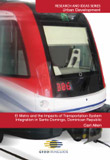
El Metro and the Impacts of Transportation System Integration in Santo Domingo
By Carl Allen
Santo Domingo’s rapid growth and largely informal public transportation system have left the city with inadequate capacity, substantial congestion, pollution and safety problems. The city’s system inefficiencies and limited accessibility to job and population centers are typical in developing countries.
Buy on Amazon (English – Spanish) | Download it here >

